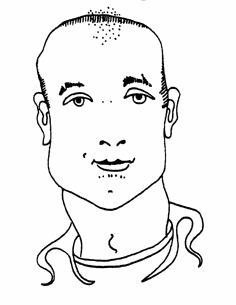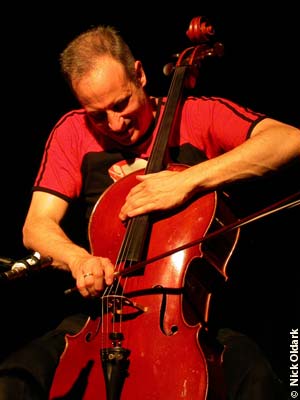 |
Erik Friedlander (NYC) solo cello
Block Ice and Propane Tour
&
Fred Gaysek (Toronto) poetry
presented by Rough Idea & RMS |
|
| July 20, 2007 • St. Andrew-by-the-Lake • Toronto (Island) |
|
|
|
|
|
|
Re-tuning
by David Fujino |
| Fred Gaysek was introduced by poet and fellow Toronto-Islander, Victor Coleman, as someone who "is not a career poet". |
| So right off, the audience knew where Gaysek stood, and should be placed, creatively speaking.
Gaysek's poetry was specific — and terrific. His simple diction and repeating phrases drew you into an everday world full of change and transformation.
"Angels fell on the highway" ... "Stepping one full moon after one full moon" ... "All of us aging beyond dream" ... such word energy prepared the way for the broad lamenting language conceptions in his newly completed, fine piece, "Toronto Harbour Sequence".
As Gaysek began reading this sequence out loud, he started to walk down the aisle towards the entrance to the church, then he turned around at the aisle's end and walked back towards the altar, all the while reading.
His "Toronto Harbour Sequence" employed key and very moving phrase sequences like:
|
|
 |
|
| "Music from a window/ends/hearts reel and hearts fall ... Faith bedevils them all ... The wood church survives legislation ... Nature regrets nothing ... Black willows swing over grass and sand ... Music from a window/ends/hearts reel and hearts fall ... Faith bedevils them all ... The wood church survives legislation ... Black willows swing over grass and sand ..."
The mood was set for Erik Friedlander.
The NYC cellist mostly played pieces from his brand new CD, Block Ice and Propane (Skipstone Records), a group of compositions and improvisations based on his memories of summer camping trips taken with his sister and parents.
Erik's father, the photographer Lee Friedlander, liked to build vacations around his teaching assignments and photo shoots (at one time, Lee Friedlander's photographs graced the album covers of Atlantic Records), so each summer, in a 66 Chevrolet pickup truck with a thin-shelled box on top for a camper, he drove off with his family into America. A block of ice kept their food from spoiling; their stove was a propane gas stove.
|
| Erik described Block Ice and Propane as "a roots-inspired music"; and indeed, in his opener, hints of fast Bluegrass lines and an "Old Joe Clark" banjo melody kept peeking out as he impressively, and simultaneously, laid down an active pizzicato bass line. The sonorities were very rich in this composition.
His classical-inspired tone was sweet and clear, and he often played his cello like a lightly strummed guitar, especially in "Dream Song", where a blossoming country sound — reminiscent of Pat Metheny — placed us in the wide open spaces of the American West.
In a composite rendition of "Road Weary" and "King Rig" — both slow moving, bowed pieces — Friedlander adroitly interposed a mixture of pizzicato notes, mellow double stops, and softly chordal, banjo-like asides. By contrast, the happy country blues, "Yakima", with its plucked and strummed and chorded melodies, was all about the skipping and carefree days of summer.
But there was humour, too, as in "Cold Chicken"; a pulsing tune that immediately accelerated into furious bowing, then ground to an abrupt stop in about 60 seconds, cold.
|
|

Erik Friedlander |
|
| In this well-conceived concert — which had a thoughtful tonality to it — both Friedlander and Gaysek struck me as gentle, empathetic souls; in the act of sharing their art, they also revealed a respect for this life we lead. |
|
|
| Erik Friedlander: blockiceandpropane.com • www.erikfriedlander.com |
| Fred Gaysek: www.chbooks.com/archives/online_books/young_man/index.html |
|
|
|
|



